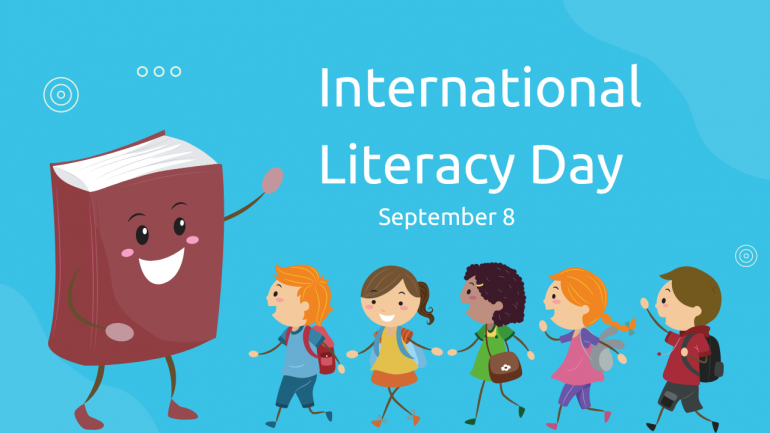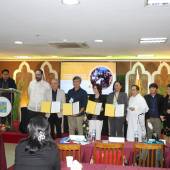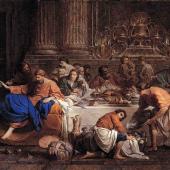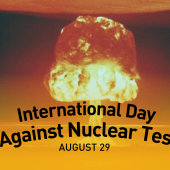International Literacy Day

Collins Dictionary defines literacy as the ability to read and write. Someone who cannot read or write will have difficulty leading a successful and meaningful life.
Literacy will lead you to better knowledge. Knowledge is power. Knowledge and experience will lead you to a successful life.
Poverty and illiteracy go together. They never come alone. It is difficult to get an education in poor places. Although education is available, a poor family prioritizes working for money or food rather than going to school.
Literacy is very much related to reduced poverty, improved socio-economic status, and health care.
Nelson Mandela, former president of South Africa, said, "Education is the most powerful weapon with which you can change the world."
Many countries and governments all over the world believe that the literacy rates of children are directly effective on the future welfare of their countries.
When we are hungry, we try to search for food or something to eat. We only noticed and felt the physical hunger and looked for ways to solve the physical hunger.
Most of us did not notice the hunger for knowledge in our brains and largely ignored it. As we feed our bodies with food, we should feed the hunger for knowledge by reading useful books.
Mostly, knowledge comes from two main sources: one is from nature, and the other is from learned or experienced people and their recorded books.
Spiritual books will control your wants and evil tendencies and help with the well-being of yourself and society. Science books will help you to create something new.
Every society needs to know the importance of literacy to solve the problems of our society.
Good and useful books will lead you to the good life, and evil books will lead you and society into danger. We need to be wise enough to choose what is good and useful for us and our society.
Literacy is a blessing often taken for granted. Reading is essential in our daily lives. Navigating the world without being able to read or write is challenging and a blockade to experiencing so many things.
"Literacy is a bridge from misery to hope," said Kofi Annan, former Secretary-General of the United Nations.
So, we have to strengthen the literacy of our society because we hope it is the best way to maintain the well-being of our human society on the planet.
Since 1967, the world has been celebrating "International Literacy Day (ILD)" every year on September 8 to raise awareness of the basic human right to literacy.
ILD was founded by the proclamation of the United Nations Educational, Scientific, and Cultural Organization (UNESCO) in 1966 "to remind the public of the importance of literacy as a matter of dignity and human rights, and to advance the literacy agenda toward a more literate and sustainable society."
UNESCO reported that there are at least 771 million illiterate adults in the world, although the literacy rate is improving. Illiteracy remains a global issue.
ILD will be celebrated this year with the theme, "Transforming Literacy Learning Spaces" to reconsider the resilient, qualitative, equitable, and inclusive education of learning spaces for all.
In 2020, most schools all over the world were closed due to the COVID-19 pandemic. Over 90% of students worldwide are unable to attend school. UNESCO reported, "By April 2020, close to 1.6 billion children and youth were out of school.
And nearly 369 million children who rely on school meals need to look to other sources for their daily nutrition. The global pandemic affected many consequences of improving global education.
Education should be accessible to everyone. No one is excluded from having the right to education. We need to create extraordinary learning spaces apart from the formal educational places of schools, institutes, or universities. The learning spaces can be free, small libraries or public places.
Some years ago, there were small bookshelves beside the moat of Mandalay, Myanmar. Anyone can read the books freely and put them back on the shelf after reading them. If someone wants to donate the books, they can place them on the small bookshelf.
During the time of the global pandemic, the internet was also one of the popular means of learning. Many virtual classrooms, lectures, seminars, and discussions are conducted online.
These are some of the reasons for the importance of literacy to everyone.
Daily reading, writing, and calculating help our brain cells be healthy and productive. In old age, they will help to reduce the chance of Alzheimer’s and dementia.
Illiteracy disturbs adults' and children's ability to participate fully in society. They cannot contribute to the welfare of society.
Literacy helps us communicate effectively with others, express ourselves more clearly and contribute to the common good in society.
Literacy helps you go up the social-economic ladder. Literacy will drive away poverty, exploitation, and injustice.
The ability to read and write gives us our dignity, confidence, and a sense of worth, and always assert our rights.
Getting involved with International Literacy Day means making an important difference in the lives of people who want and need to learn how to read and write. We can teach some children or adults who want to learn how to read and write.
International Literacy Day is also a clarion call for governments to allot needed financial resources to create more spaces for learning and education for all, especially people who have no access to education or people who live in far-flung areas lacking basic opportunities and facilities for learning. Besides, governments and private agencies/institutions are urged to provide opportunities for the poor and marginalized communities and people who may not be able to afford to learn.
In short, World Literacy Day is a great time to get inspired to help children and adults read. So grab some books at a new or used bookstore and donate them to a literacy program or underfunded school in the community.
Give a book as a gift to a child or someone and feel great about helping others learn to read.
Radio Veritas Asia (RVA), a media platform of the Catholic Church, aims to share Christ. RVA started in 1969 as a continental Catholic radio station to serve Asian countries in their respective local language, thus earning the tag “the Voice of Asian Christianity.” Responding to the emerging context, RVA embraced media platforms to connect with the global Asian audience via its 21 language websites and various social media platforms.













